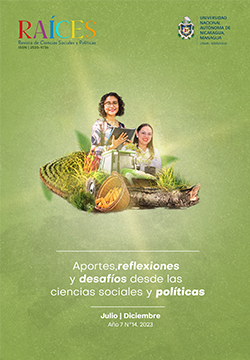Relaciones y estrategias de género en las mujeres de la comunidad de San Isidro, Nagarote
DOI:
https://doi.org/10.5377/raices.v7i14.17853Palabras clave:
Comunidad, mujeres rurales, participación política, género, estrategia de poderResumen
Este artículo investiga acerca de las relaciones y estrategias de género de las mujeres rurales, específicamente en la comunidad rural de San Isidro del municipio de Nagarote, Nicaragua. El trabajo enfatiza en la participación política y las estrategias de poder y autonomía que ejercen las mujeres en la vida social de la comunidad, e incluso en la construcción de sus propios espacios y estrategias de género. El artículo destaca aspectos relacionados a la comunidad, al estatus y rol que ejercen las mujeres y su incidencia en la toma decisiones tomando en cuenta que las relaciones de y estrategias de género en el ámbito rural se expresan diferentes al ámbito urbano. Los hallazgos de la investigación que aquí se presentan son el resultado de la aplicación de las técnicas de revisión bibliográfica relacionada al objeto de estudio, la observación y de entrevista realizadas a mujeres protagonistas de la comunidad.
Descargas
266
Citas
Martínez, A & Alcalá-Sánchez, I. (2012). La migración campo-ciudad, un grave problema social y educativo. Universidad Autónoma de Chihuahua. México. http://cie.
uach.mx/cd/docs/area_07/a7p11.pdf
Martínez, J (1997/1998). Cultura, identidad y cambio social. Los procesos de reidentificación cultural en el medio rural del país vasco. KOBIE (Serie Antropología Cultural). 8, 55-65. https://www.bizkaia.eus/fitxategiak/04/ondarea/Kobie/PDF/5/Kobie_8_Antropologia _cultural_CULTURA,%20IDENTIDAD%20Y%20 CAMBIO%20SCIAL_LOS%20PROCESOS%20DE.pdf?hash=e02c3090af0b-98d513fd487eb210c7d2
Moreno, A (1986). Sexismo y androcentrismo. http://www.amparomorenosarda.es/es/ node/53 MINED. (2009). Sistematización de Campaña Nacional Alfabetización de Martí a Fidel. Managua. https://siteal.iiep.unesco.org/sites/default/files/sit_accion_files/ni_0025.pdf
Murguialday, C. (2006). Empoderamiento de las mujeres: conceptualización y estrategias. España.
Ley N° 648. Diario Oficial la Gaceta, Managua, Nicaragua, 12 de marzo de 2008.
Ley N° 786, Ley de reformas y adición a la ley N° 40 “Ley de Municipios”, Managua, Nicaragua, 09 de marzo del 2012.
Pérez, E. (2001). Hacia una nueva visión de lo rural. CLACSO, Consejo Latinoamericano de Ciencias Sociales. Buenos Aires. https://bibliotecavirtual.clacso.org.ar/clacso/gt/20100929011414/2perez.pdf
Perilla, L. (2014). Los roles de las mujeres rurales en el departamento de Nariño, Colombia. Tendencias y cambios. Revista Trabajo Social 16,187-204. https://revistas.unal.edu.co/index.php/tsocial/article/view/47069/48375
PNUD Nicaragua, (2014). Estrategia de equidad de género PNUD Nicaragua, 2014-2017. Oficina de Nicaragua. https://procurement-notices.undp.org/view_file.cfm?doc_id=51929
Rodríguez, A; Pérez, A. (2017). Métodos científicos de indagación y de construcción del conocimiento. Revista EAN, 82, 179-200. https://doi.org/10.21158/01208160.n82.2017.1647
Serrano, P. (2012). La perspectiva de género como una apertura conceptual y metodológica en salud pública. Rev Cubana Salud Pública, 38, 811-822. http://scielo.sld.cu/scielo.php?script=sci_arttext&pid=S0864-34662012000500014
Descargas
Publicado
Cómo citar
Número
Sección
Licencia
Derechos de autor 2023 © Universidad Nacional Autónoma de Nicaragua, Managua, UNAN-Managua

Esta obra está bajo una licencia internacional Creative Commons Atribución-NoComercial-CompartirIgual 4.0.
Esta licencia permite a los reutilizadores distribuir, remezclar, adaptar y desarrollar el material en cualquier medio o formato únicamente con fines no comerciales, y siempre y cuando se otorgue la atribución al creador. Si remezcla, adapta o construye sobre el material, debe licenciar el material modificado bajo términos idénticos.




